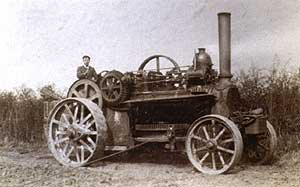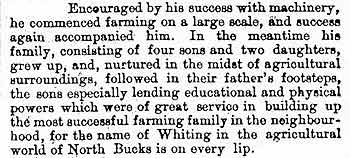 |
 |
 |
 |
 |
 |
 |
 |
 |
 |
 |
 |
 |
 |
 |
 |
 |
 |
Willen People
|
 |
 |
 |
 |
 |
 |
 |
 |
 |
 |
 |
 |
 |
 |
 |
 |
 |
 |
 |
 |
 |
 |
 |
 |
|
 |
 |
 |
 |
 |
 |
 |
 |
 |
Joseph Evan Whiting, patriarch
|
 |
 |
 |
 |
 |
 |
 |
 |
Joseph Evan Whiting senior was a small local farmer. He farmed the same 100 acres that his family had farmed for over 100 years. But Joseph believed in 'progress'.In 1836 he bought his first seed drill and started hiring himself out to other farmers. Gradually he built up his business, buying another seed drill, then a threshing machine and then a steam engine (see picture); the first in the area. To start with there was lots of local opposition and he had to travel 30-40 miles to get work. |
 |
 |
 |
However, he did find an ally in Farmer Smith of Great Woolstone, the inventor of the steam plough, for whom he did much work. As he made money, Joseph was able to obtain more land. The landowners such as Lord Carrington and Mr Carlisle MP were happy to let him have leases on their farms because they could see his was a good, hardworking farmer.
|
 |
 |
 |
 |
 |
 |
 |
 |
 |
 |
 |
 |
 |
 |
 |
 |
 |
 |
 |
 |
 |
 |
 |
 |
 |
 |
 |
Joseph also believed in a good education being the key to success. He sent his sons to school. His eldest son Joseph did not join his father in the business until he was 15. On his death in the late in 1888, three of his sons: Joseph, George and Charles decided to farm as a partnership. Henry, decided to continue with his dairy business alone.
|
 |
 |
 |
 |
 |
 |
 |
 |
 |
|
|
 |
 |
 |
 |
 |
Bucks Standard, 21st April 1888 |
 |
 |
 |
 |
 |
 |
 |







